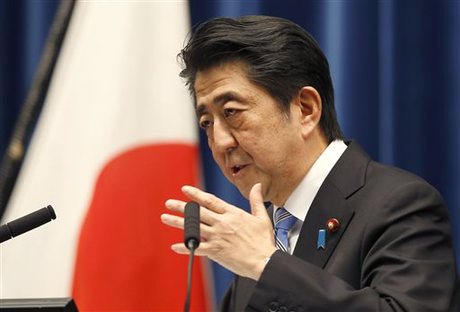Japan Lower House Dissolved in 'Referendum on Abenomics'
إقرأ هذا الخبر بالعربية
Japan's lower parliamentary chamber was dissolved Friday ahead of a mid-December general election that Prime Minister Shinzo Abe says will be a referendum on his faltering "Abenomics" economic growth blitz.
Following the dissolution, the premier's cabinet confirmed the election will be held on Sunday, December 14, said Chief Cabinet Secretary Yoshihide Suga, Tokyo's top spokesman.
Later, Abe told reporters at his office that the vote will be "an election to ask if we should push for Abenomics or stop it".
Abe, who is going to the polls less than half way through a four-year term, earlier said he wanted voters' endorsement for his decision to postpone a sales tax rise slated for next year, after data this week showed an earlier levy hike knocked the world's number three economy into recession.
"Finally, the fight will begin," Abe told fellow politicians on Friday who cheered in response to the remarks in parliament.
"Let's fulfill our responsibility to make Japan a country that once again shines at the center of the world.
"I promise to take the lead so that all of you here will be elected. Let's grab a win together."
On Thursday, Abe acknowledged he could be facing a "tough election".
"I want to clarify if the growth strategy we are pushing is right or wrong," he told a business audience in Tokyo.
But most commentators agree that the election is a fig leaf to cover Abe's attempt to consolidate his own position within his fractious Liberal Democratic Party, and to fend off challengers in a party leadership election scheduled for September next year.
Abe runs the risk of undermining his authority if his coalition's majority is reduced too much.
The last 24 months have seen two of the so-called "three arrows" of the premier's policy blitz fired -- massive fiscal stimulus and a flood of easy money.
A third "arrow" of structural reforms has inched along in the face of resistance from the vested interests that it is intended to undermine, including a politically powerful farm lobby.
"The third arrow has never flown at all because it faces resistance" even from Abe's own conservative LDP, Kenji Eda, co-leader of the opposition Japan Restoration Party, said Thursday.
While many economists say that it's crucial to press on with reforms, critics worry that Abe's growth blueprint will leave Japan saddled with more debt -- it already has one of the worst debt burdens among rich nations.
"We can't have the (rich-poor) gap widen," said Banri Kaieda, head of the main opposition Democratic Party of Japan.
"We can't give him a blank cheque for another four years."
According to opinion polls conducted by the Asahi newspaper this week, the Abe cabinet's approval rate fell to 39 percent from 42 percent earlier this month.
Its disapproval rate rose to 40 percent from 36 percent, pushing it above his approval rate for the first time since he took office in December 2012, the survey showed.
The sales tax delay will put off a rise to 10 percent, after the first increase to 8.0 percent from 5.0 percent on April 1 sent consumers scurrying for cover and took a huge bite out of the economy.
Originally scheduled for next October, Abe said the fresh hike would now not take place until at least early 2017.
But the Asahi survey said 65 percent of voters were not convinced by his reasoning to call a snap election.
Meanwhile, a new mandate would bolster the premier's case for pushing ahead with the re-starting of nuclear reactors -- an unpopular idea in a nation scarred by the 2011 Fukushima disaster, the worst atomic crisis in a generation.
It would also strengthen Abe's hand on pet issues such reforming Japan's view of its 20th century military aggression, which he and other nationalists say is masochistic.



